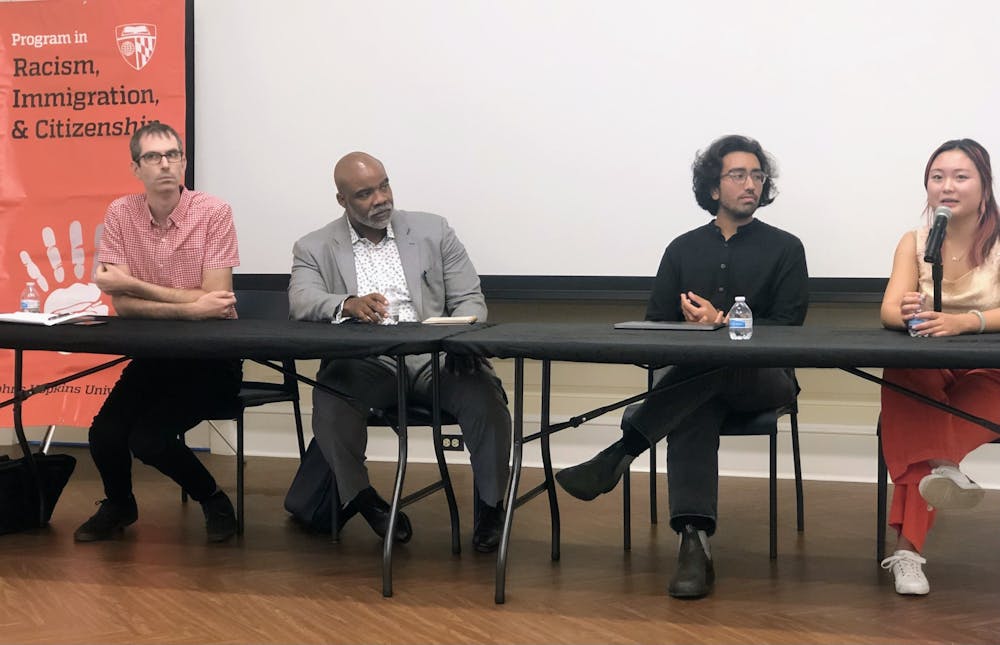The Program in Racism, Immigration and Citizenship (RIC) hosted its annual Fall Kick-Off Event and Reception on Sept. 14. The panel provided an opportunity to discuss the work of RIC research fellows and the importance of historical exploration in light of affirmative action’s termination.
Free to attend, the event featured presentations by RIC Director Nathan Connolly, RIC Graduate Fellow Sheharyar Imran and RIC Undergraduate Fellow Natalie Wang. A reception followed afterward.
Connolly explained RIC’s mission in an interview with The News-Letter. He shared the objective of making an argument against institutional racism and discriminatory histories, starting with university-based policies themselves.
Following the U.S. Supreme Court's decision to end affirmative action in college admission processes, RIC is exploring the importance of affirmative action as a method of historical redress. During the event, presenters urged all Hopkins community members to join them by probing into the history of the University through research projects and community engagement.
To begin, Connolly described how RIC research findings can contribute to institutional changes, resulting in real-world impacts for the Hopkins and greater Baltimore communities. He detailed the creation of one such change on the University campus.
“We were hearing stories about Pulitzer Prize winner Tracy Reeves in the Communications Office being intimidated. Other representatives in finance offices being physically assaulted, folks in other corners — security, food services — experiencing a kind of violence that doesn’t seem like it has a place on a university campus,” he said.
The RIC’s research into Black experiences on campus led to discussions about redress and grievances that ultimately created the Staff Advisory Council, which provides staff members with security and avenues for quality control.
Next, Wang shared her experience studying the history of Hopkins. Through her summer archival research project, she focused on the history of student-led advocacy in the university, with a special emphasis on curricular justice. In her presentation, Wang described the legacy of student advocacy by detailing student protests that took place as early as the 1980s, such as the construction of mock shanty towns in response to apartheid, to those from only a few years ago, like the Garland Hall sit-in in 2019.
Wang explained the importance of building institutional memory to create change.
“It is a lot harder to make any kind of change when most students on campus don’t remember what happened five years ago because they weren’t there,” she said.
In an interview with The News-Letter, sophomore Vanessa Han revealed that listening to Wang’s presentation made her more optimistic about the effects students can have on campus, even if they are not focused on studying the humanities.
“Hearing the long string of pre-med students who have been at the center of all of these efforts really made me feel hopeful that we can do something about issues that we're passionate about,” Han said.
In his presentation, Imran discussed the history of RIC and the importance of RIC’s work as proactive and ongoing efforts, rather than reactionary to moments of crisis, such as the affirmative action decision.
“Focusing on only these exceptional moments of crisis obscures that very ongoing and structural nature of racialized discrimination that not only constitutes the social fabric of this country but also by extension defines the institutional landscape we find ourselves enmeshed in,” Imran said.
Both speakers also discussed the Initiative for Critical Diaspora Studies (CDS) as a new major at Hopkins. This new major would diversify undergraduate education and allow students to explore migration and displacement within the broader context of white supremacy and colonialism. According to Wang, the CDS proposal is currently under review by the Homewood Academic Council.
Sophomore Sandy Monter-Casio voiced her thoughts on the importance of implementing the major in an interview with The News-Letter.
“Race is so important, and I literally can't think of a discipline or major that doesn't need a race-based education. The history and existence of race is ingrained everywhere,” she said.





